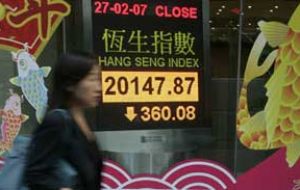MercoPress. South Atlantic News Agency
China's black Tuesday spills to the global economy
 China fall drags World markets
China fall drags World markets Stock markets round the world slumped Tuesday to record lows of 2001 and 2004, with the US Dow Jones index plummeting by more than 400 points and Latinamerican markets posting sharp losses averaging 4%.
The sell-off was sparked by a near 9% down slide on the Shanghai Composite Index, (the worst in a decade) as investors worried that China may pass rules to limit demand for stocks. Banks, automobiles and steel companies were hardest hit.
The Dow Jones fell more than 500 points at one point, before closing down 416.02 points, or 3.29%, at 12,216.24. Elsewhere on Wall Street, the technology-laden Nasdaq index closed down 3.86% at 2,407.87, while the S&P 500 index closed down 3.47% at 1,399.04. The New York Stock Exchange instituted trading curbs at mid day Tuesday in a bid to stem falls on the US stock market, although the move was not enough to prevent the Dow plunging nearly 300 points in a matter of minutes in late trading. European markets suffered as well, with the main indexes of the Paris and Frankfurt stock exchanges shedding about 3% each; the London's FTSE 100 closed on a fall of 2.3% and Madrid 3.01%. Earlier in the day, Hong Kong's Hang Seng index had ended trading on a loss of 1.8%, while Japan's Nikkei 225 index slid 0.52%. Kuala Lumpur lost 2.81%; Jakarta 1.12%; Manila 1.44%; Singapore 2.29% and Bangkok 0.69%. The eyes of investors will now be on Asian markets to see whether the investor panic spreads. If that happens, European and US markets could face another round of sell-offs. The first stock market to open Wednesday the new trading day in the Asia-Pacific region, New Zealand, saw key share prices plunge nearly 3% during the first hour. In Latinamerica the Mexican index slumped 5.69%; Chile's IPSA, 4.97%; Argentina's Merval 7.49% and Brazil's Bovespa 6.29%. Latinamerican economies on the roller coaster of high commodities prices are set to suffer if the Chinese and US economies enter a cooling period. In Argentina's grain markets, soybeans, corn and sunflower reflected a first downward reaction. Investor sentiment on Wall Street was also knocked by figures showing that US growth may be slowing down more than anticipated, with a government report earlier showing that orders for durable goods in January had dropped by the largest amount in three months. Furthermore former Federal Reserve chairman Alan Greenspan forecasted a recession in the US economy in late 2007. China has been one of the main emerging markets for many investors as the country's economy has grown strongly and the government has sold stakes in some of its biggest and most attractive companies. However, Beijing has been looking at ways of slowing growth in order to stop the economy from overheating, and many investors are worried that it may lead to tougher regulations that will limit stock-market investment. At the same time, there are concerns that interest rates will have to be raised in order to rein in economic and price growth, further denting domestic demand for shares. China's Popular Bank soaked liquidity from the market by ordering banks to comply with a February 25 resolution increasing their holdings in the Central Bank by up to 10%. In Washington the White House said it was closely monitoring financial markets follow Tuesday's slump, although no details were offered. Spokesperson Tony Fratto said "presidential advisors always have an eye on markets and this is daily routine". In Beijing authorities announced the creation of a special committee with representatives from the Stock exchange comptrollers, the Central Bank, Trade Ministry and Police which will check into the origin of funds, privileged information and related crimes. Foreign investors have repeatedly complained of the "opacity" of Chinese markets and authorities are concerned that the booming markets could turn into an exploding bubble hurting millions of small investors' savings the government has lured to invest in stocks. "There's a huge bubble. Investors must begin worrying about risks" warned Cheng Siwei vice-president of the National Assembly (Parliament). In 2006 the Shanghai Stock Exchange ballooned 130% pushed by investors' euphoria and the booming Chinese economy.




Top Comments
Disclaimer & comment rulesCommenting for this story is now closed.
If you have a Facebook account, become a fan and comment on our Facebook Page!